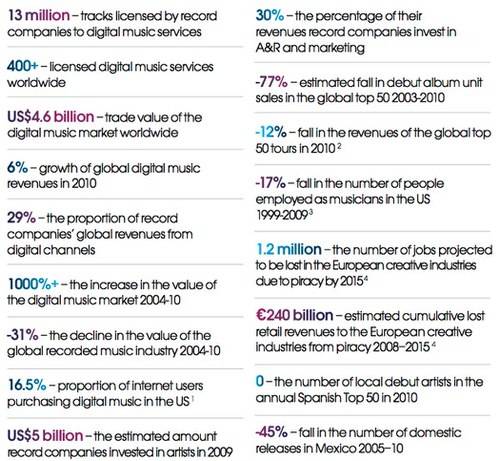It’s a familiar refrain from the music industry: revenue is down and piracy is to blame. That’s the gist of the the International Federation of the Phonographic Industry‘s (IFPI) annual Digial Music Report, which points to a slowdown in the growth of digital music sales.

While digital music revenue has grown 1,000% over the past seven years, the entire music industry has lost a third of its value over that same time period. And while digital music seems to represent both the best hopes and the worst fears of the industry, even its growth is slowing – only 6% last year, down from 9.2% growth in 2009. Digital sales comprise about a third of the industry’s total revenue.
Pirates (Not Inflexible Business Models) Are to Blame
“While record companies are innovating and licensing every viable form of music access for consumers,” says IFPI chief executive Frances Moore, “the music industry is still haemorrhaging revenue as a result of digital piracy.”
Moore labels this “a crisis affecting not just an industry – but artists, musicians, jobs, consumers, and the wider creative sector.”
This sort of rhetoric – “crisis,” “haemorrhage,” “the need for rule of law on the Internet” – isn’t new for the music industry. But the report does say that in 2010 governments, at the industry’s urging, seemed more willing to take action to crack down on music piracy. The report points to the closure of the file-sharing site Limewire and blockage of Pirate Bay in Italy and Denmark as positive efforts.
Will Subscription Services Save the Industry?
The report also pins its hopes on the growth of subscription services, arguing that the rise of these alternatives has been driven by consumer demand for digital music. The report says that 2010 “broke the seal” on subscription services, as these became more widely available – on more devices, in more locations. But as the report notes, licensing issues remain a challenge.
Those licensing issues have been an obstacle to companies seeking to offer legitimate subscription services. Most notably, Spotify has had to delay its launch in the U.S. because of difficulties striking deals with the major music labels.
But it’s piracy, not licensing, that the IFPI cites as the major obstacle to a thriving music industry, citing job losses and “victimized” developing artists. Addressing this, according to the report, is the government’s responsibility, and it argues that as such it can “turn the tide against piracy in 2011.”


















